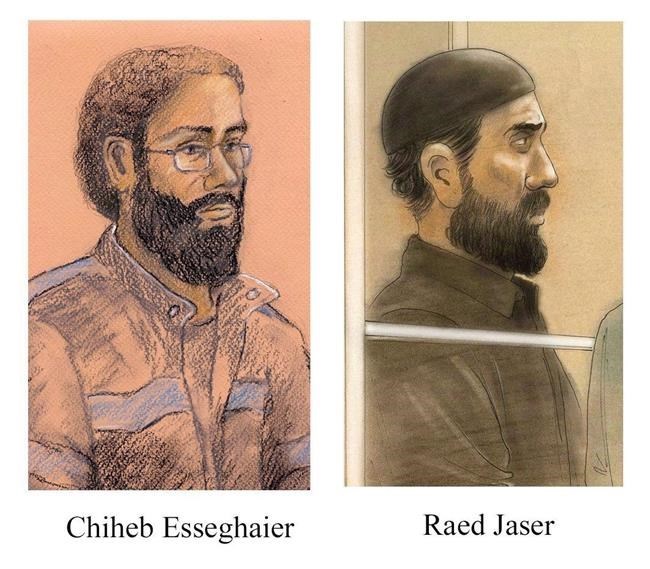OTTAWA — The Supreme Court of Canada says two men convicted of terrorism offences received a fair trial even though the judge made an error in assembling the jury.
The top court explained its reasoning Friday for ruling last October there would be no new trial for Raed Jaser and Chiheb Esseghaier.
Jaser and Esseghaier were found guilty in 2015 of terror-related charges arising mainly from an al-Qaida-inspired plot against a Via Rail passenger train travelling between the United States and Canada.
They appealed their convictions, with counsel for Jaser and a court-appointed lawyer for Esseghaier arguing the jury at the trial was improperly constituted.
In August 2019, the Ontario Court of Appeal ordered a fresh trial for the men on grounds the jury was indeed chosen incorrectly.
The Crown successfully argued in a Supreme Court hearing last fall the convictions should not be overturned on the basis of an error in the jury-selection process that did not deny the men fair trial rights.
In a unanimous ruling from the bench, the top court essentially agreed and allowed the federal appeal, saying written reasons would follow.
With the jury issue settled, the top court remitted the case to the Ontario Court of Appeal to deal with the men's outstanding challenge of their actual convictions. That thread of the appeal is still unfolding.
Before the terrorism trial, the case's high profile and the fact the two accused were Muslim and members of a racialized minority meant that prospective jurors were asked about their ability to be impartial.
There were two methods for doing so — the use of rotating triers and static triers.
As the court notes, the first method involves two people serving as rotating triers until the first jury member is chosen. The first juror then replaces one of the triers, who is excused, and assumes the role of trying whether the next prospective juror is impartial.
In 2008, a second procedure — the use of static triers — was introduced. Under this method, two people decide all challenges themselves until the jury is sworn in. Once done, the two static triers do not become members of the jury.
Counsel for Jaser wanted the challenges to proceed using rotating triers, with the other prospective jury members excluded from the room. Esseghaier was unrepresented, as he rejected the criminal justice system on religious grounds.
Due to the 2008 changes, there was uncertainty as to whether the procedure Jaser requested was even still available, and the judge eventually approved another method: static triers with all jurors, both sworn and unsworn, excluded from the room.
In its 2019 ruling, Ontario's Appeal Court said Jaser was improperly denied his preferred option for jury selection. The court also said that if Jaser should have a new trial, Esseghaier was also entitled to one.
In the newly released explanation of its October 2020 decision, the Supreme Court said while the men did not get "the exact trial they wanted, our law does not demand perfect justice, but fundamentally fair justice. This is what they received."
Although the use of static triers was incorrect in the circumstances, it was one of the two legally sanctioned procedures at the time of the trial, the court said.
In addition, there was no risk of tainting the jury, as both the sworn and unsworn jurors were excluded from the courtroom.
The Supreme Court also found the actual implementation of the procedure by both the trial judge and the static triers was handled with the care and attention needed to ensure the fair trial rights of the accused were protected.
"Accordingly, there was no infringement of the right to a fair trial by an independent and impartial jury, no prejudice, and no substantial wrong or miscarriage of justice."
This report by The Canadian Press was first published March 5, 2021.
Jim Bronskill, The Canadian Press


